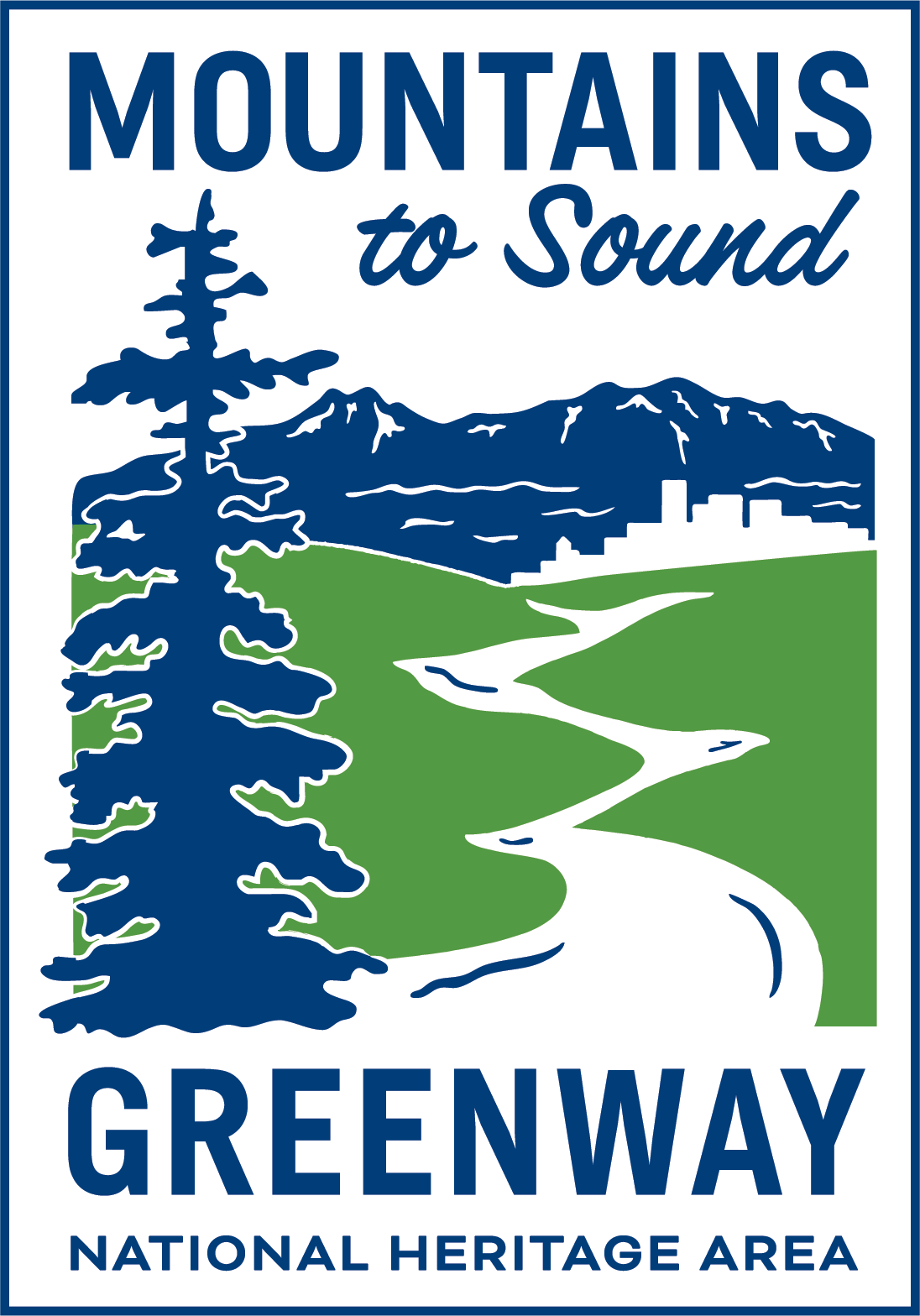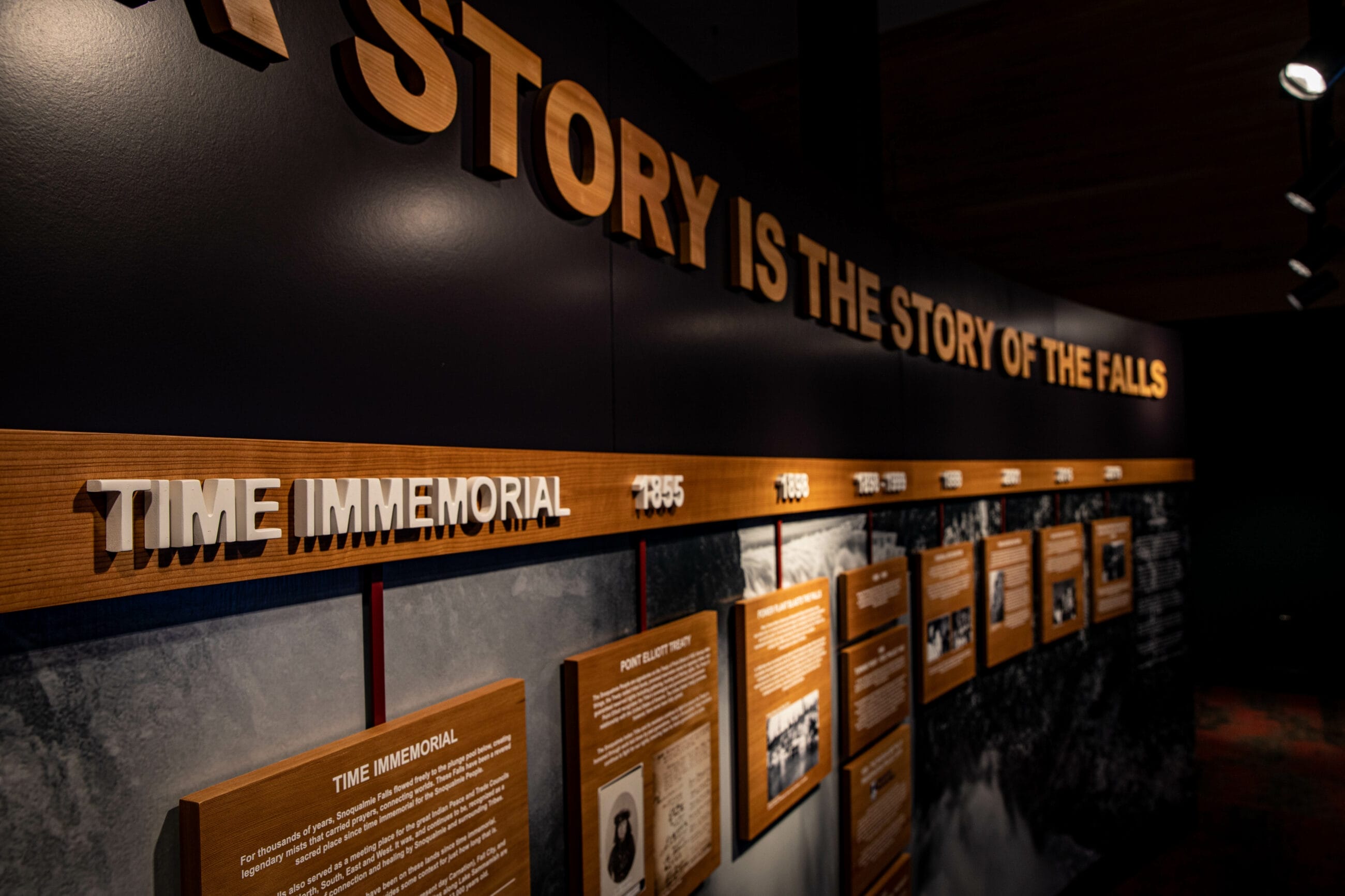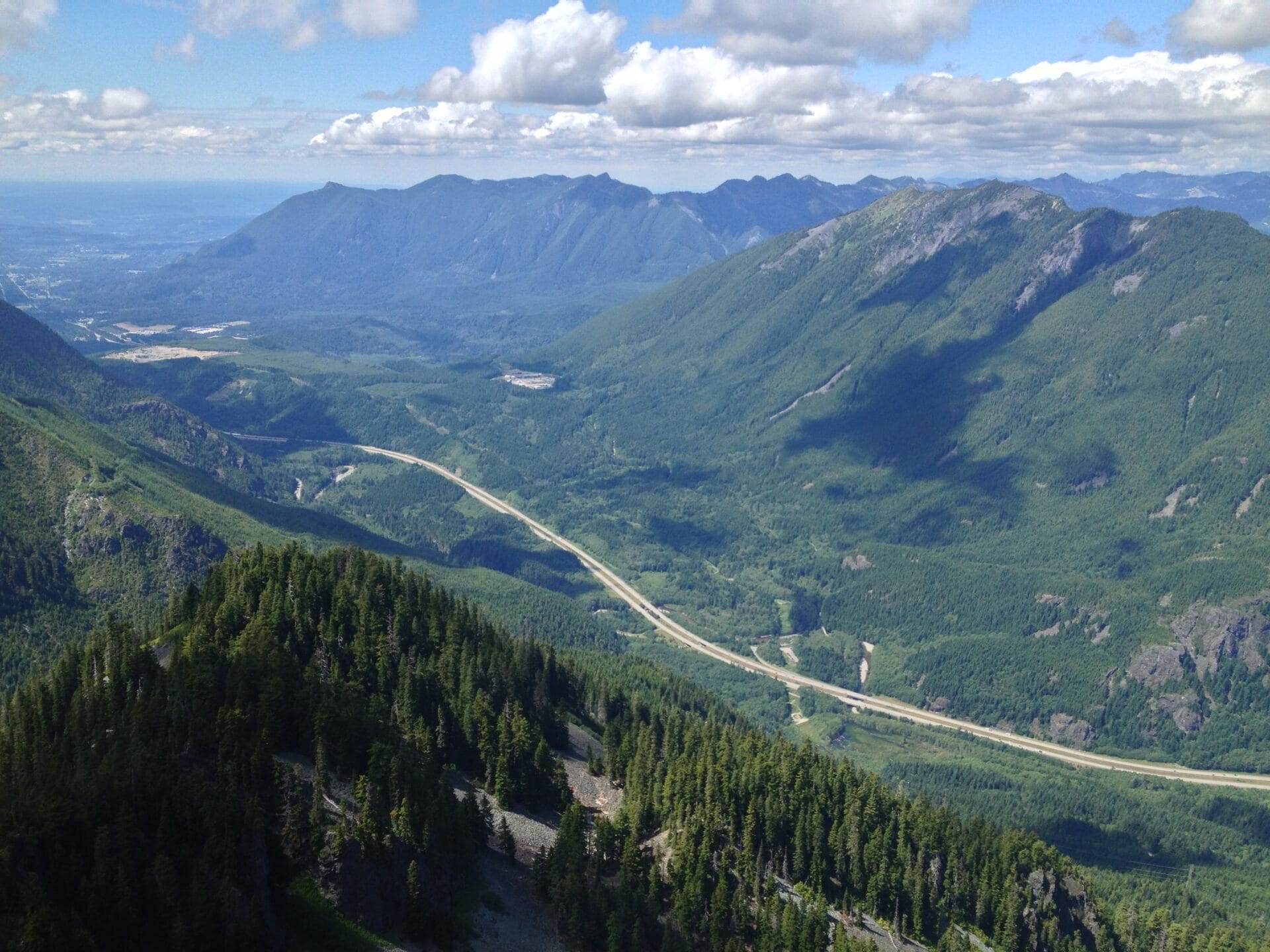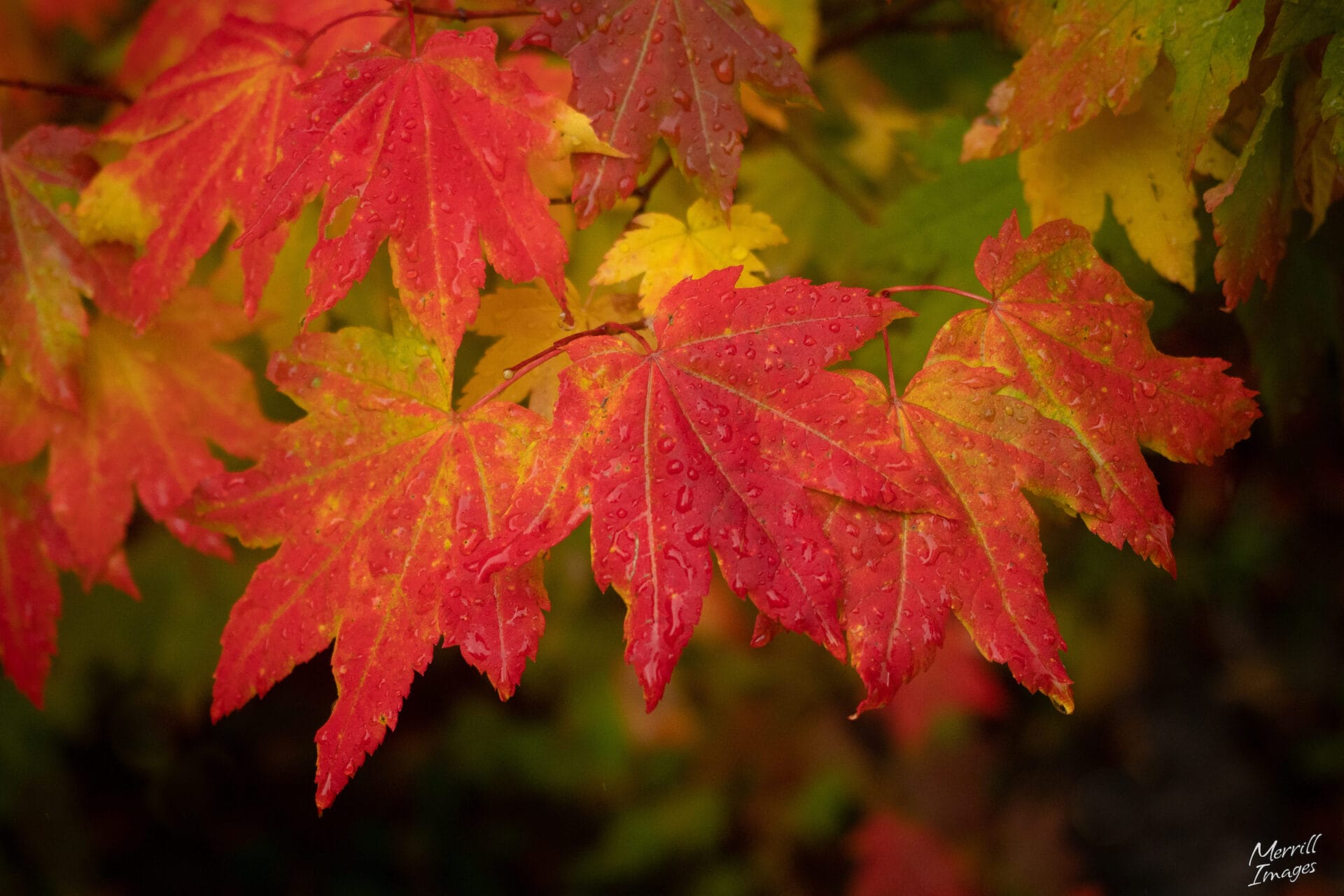11 Places to Learn About and Support Tribal Heritage
Since time immemorial, Tribes have lived on, cared for, and governed their ancestral homelands including lands and waters within the area designated as the Mountains to Sound Greenway National Heritage Area (Greenway NHA). Tribes have an integral and interdependent relationship with these lands, waters, and natural resources that is interwoven with tribal identity, culture, values, and knowledge.
Whether it’s your first visit to the National Heritage Area or you’ve lived here your entire life, it’s essential that you treat the lands you visit with respect and take time to learn about Tribal heritage and the importance of these lands to the Tribes in the region. The locations below provide opportunities for that learning, where Tribes and Tribal members are able to express the stories of their people firsthand.
Itinerary
-
Daybreak Star Indian Cultural Center
Daybreak Star Indian Cultural Center is a land base and community center for Native Americans in the Seattle area and serves as the United Indians’ headquarters. It is located on 20 acres in Discovery Park in Seattle’s Magnolia neighborhood. Daybreak Star is also home to a permanent collection of Native art, as well as the Sacred Circle Gallery featuring rotating exhibits of work by contemporary Native artists. Sacred Circle Gift Shop is located at Daybreak Star and the annual Seattle Seafair Powwow and Indigenous People’s Day celebrations are held here.

Photo courtesy of Daybreak Star Indian Cultural Center -
Duwamish Longhouse and Cultural Center
The Duwamish Longhouse and Cultural Center overlooks the Duwamish River Valley, near the village called hah-AH-poos, a major archeological site known as Duwamish Site No. 1. The Center’s proximity to this significant site, which is on the National Register of Historic Places, offers a rare opportunity to display never before seen artifacts and to create interpretive exhibits and tours to maximize its cultural and recreational public use.
The Center serves as a Tribal headquarters, education center, and meeting and ceremonial place. The space includes a historical exhibit space, Native art gallery, and Native gift shop.

-
Eighth Generation
Eighth Generation is a Seattle-based art and lifestyle brand owned by the Snoqualmie Tribe. It was founded in 2008 when Louie Gong (Nooksack)—an artist, activist, and educator widely known for merging traditional Coast Salish art with influences from his urban environment to make strong statements about identity—started customizing shoes in his living room. Now the first Native-owned company to ever produce wool blankets, Eighth Generation is a proud participant in the global economy.
Eighth Generation provides a strong, ethical alternative to “Native-inspired” art and products through its artist-centric approach and 100% Native designed products. Their Inspired Natives™ Project, anchored by the tagline “Inspired Natives™, not Native-inspired,” builds business capacity among cultural artists while addressing the economic impact of cultural appropriation.

Courtesy of the Snoqualmie Tribe -
Museum of History and Industry (MOHAI)
On view at Seattle’s Museum of History & Industry (MOHAI) from October 7, 2023 – March 3, 2024, Roots of Wisdom provides examples of how traditional knowledge and science together create complementary solutions to contemporary concerns.
From restoring ecosystems to rediscovering traditional foods and crafts, the exhibit invites guests to understand the important issues that Indigenous cultures face, discover innovative ways native peoples are problem-solving and contributing to the growing movement towards sustainability and the reclamation of age-old practices.

Courtesy of MOHAI -
Seattle University's taqwsheblu Vi Hilbert Ethnobotanical Garden
Seattle University’s taqwsheblu Vi Hilbert Ethnobotanical Garden is honored to bear the name of Upper Skagit elder taqwsheblu Vi Hilbert, a deeply respected and much-honored teacher and storyteller who led the regional revitalization of Lushootseed, the Indigenous language of the southern Salish Sea. Vi helped to create a Lushootseed language list of native plants (available for download from the garden’s website) and contributed two phrases to the garden which concisely express local Indigenous relationships with the non-human world: “The Earth is Our First Teacher” and “Gifts of the Creator.”
Ethnobotany is the study of relationships between people and plants, and the Vi Hilbert garden showcases the relationship between native plants and Lushootseed-speaking peoples. The garden invites you to learn more about this intimate, sustainable relationship and encourages you to cultivate your own caring relationship with our native plants.

Courtesy of Seattle University -
The Burke Museum of Natural History and Culture
The Burke Museum’s Northwest Native Art Gallery features rotating exhibitions from artists, as well as permanent displays of monumental objects including a 35-foot canoe, welcome figure, totem poles, and house posts.
The inaugural exhibit in the Northwest Native Art Gallery was curated by six Pacific Northwest Native artists from across the region and features both newly created and historic basketry, carvings, multimedia art, and more. Co-curators Betty Pasco (Suquamish), Pat Courtney Gold (Wasco), Evelyn Vanderhoop (Haida), Lou-ann Neel (Kwakwaka’wakw), Alison Marks (Tlingit), and RYAN! Feddersen (Okanogan and Lakes) selected works from the Burke Museum’s collections and created new pieces inspired by their reflections on artistic heritage. They come from communities across the Pacific Northwest and represent both diverse artistic backgrounds and generational experiences.
-
Hibulb Cultural Center
The Hibulb Cultural Center and Natural History Preserve mission is to revive, restore, protect, interpret, collect, and enhance the history, traditional cultural values, and spiritual beliefs of the Tulalip Tribes who are the successors in interest to the Snohomish, Snoqualmie, and Skykomish Tribes and other Tribes and bands signatory to the Treaty of Point Elliott.
The Hibulb Cultural Center is approximately 23,000 square feet with a 50-acre natural history preserve. The interactive cultural center features a main exhibit, a temporary exhibit, two classrooms, a longhouse, a research library, and gift shop. It also features a fully certified collections and archaeological repository.
-
Lake Sammamish State Park
The Cultural Native Plant Trail at Lake Sammamish State Park includes 12 signs along the Tibbetts Beach trail. Sponsored by the Snoqualmie Tribe, the signs represent native plants in the area with original tribal artwork, graphics, and text providing insight into native plant identification, a reference to Lushootseed language, and the traditional Native American use.

-
Snoqualmie Falls Gift Shop and Visitor Center
Since the beginning, the Snoqualmie People have gathered for prayers, mourning, healing, and celebration at this sacred place. The Snoqualmie Tribe’s creation history shares that they were created at Snoqualmie Falls by Transformer – Moon – who changed Snoqualmie Falls and all of the lands, animals, and plants to how we know them today. This is a sacred site not just for the Snoqualmie Tribe, but for all people, for all time. Listed on the National Register of Historic Places, acknowledging the pre-contact history, the Falls are a site of natural, historic, and cultural importance.
Learn more about the living legacy of the Snoqualmie Tribe by visiting the Snoqualmie Falls Gift Shop and Visitor Center located next to the falls. Immerse yourself in artwork by Snoqualmie Tribal artisans, explore educational resources, and indulge in local treats at their cafe.

Photos courtesy of the Snoqualmie Tribe -
Yakama Nation Cultural Center
The Yakama Nation Cultural Center is a unique, multifaceted facility offering a variety of programs that share Yakama Nation’s history and culture with all. It includes the Yakama Nation Museum, Heritage Inn Restaurant, Winter Lodge, Heritage Theater, Yakama Nation Library, and Cultural Center gift shop.
The Yakama Nation Museum is a 12,000-square-foot exhibition hall that tells the history of the Yakama People. The gift shop showcases one of a kind plateau arts and crafts of Yakama artists and other Native American art, as well as clothing and other merchandise. The Heritage Theater is a commercial and performing arts theater that presents both current popular films, as well as film festivals, documentaries and performing arts, conferences, and more.
-
Colville Tribal Museum
The Colville Tribal Museum showcases history collected by the Colville Confederated Tribes (Moses/Columbia, Wenatchee, Okanogan, Entiat-Chelan, Methow, Nez Perce, Palus, Nespelem, Colville, San Poil and Lake).
Visitors can visit the gift center with Native crafts, quilts, books, cards, posters, and more. There are also videos that explain the geology and history of the area, along with a large photo collection and murals depicting the Nez Perce Trail and Kettle Falls before it was inundated by the Grand Coulee Dam. Inside the main room are displays of basketry, beadwork, clothing, and tools from this area, as well as a diorama depicting traditional salmon fishing.












